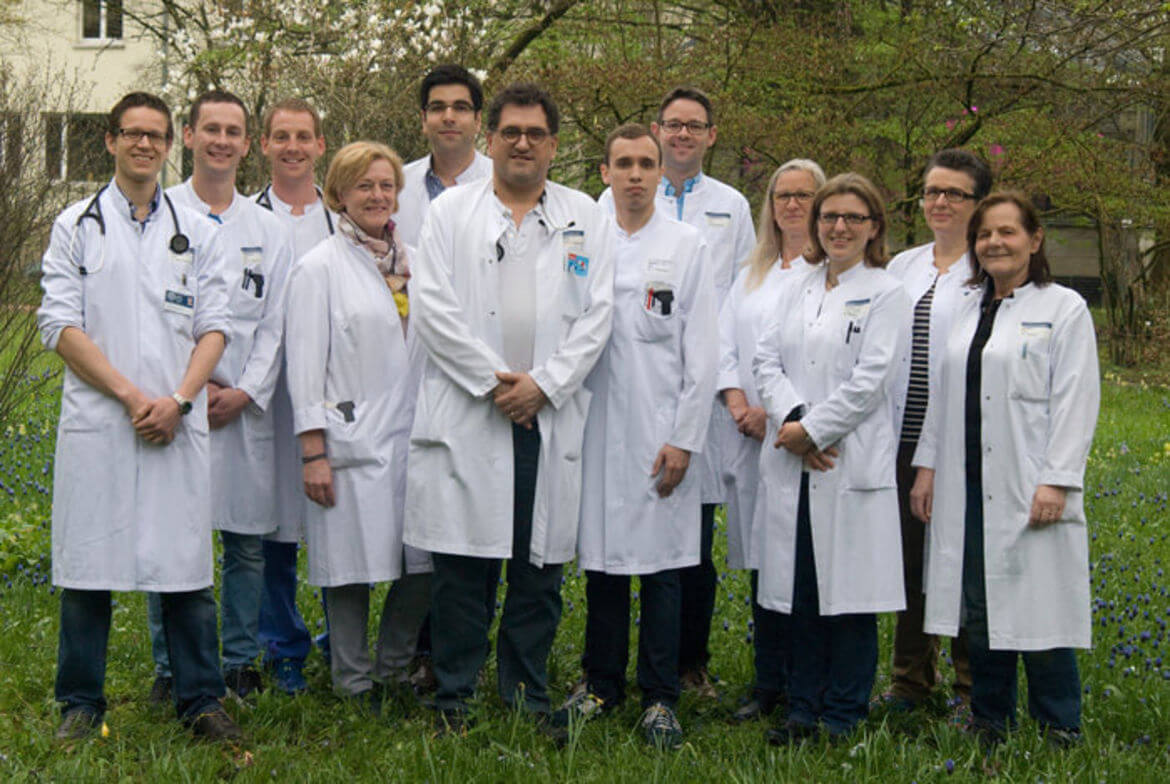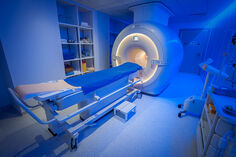- Arbeitsgruppen
- Klinisches Studienzentrum
- Sektion Kardio-Onkologie
- Section of Molecular and Translational Cardiology
- Sektion Internistische Intensivmedizin
- Klaus-Tschira-Institut für Computerkardiologie
- Heisenberg Professur für Immunkardiologie (W3)
- Heisenberg professorship for mRNA metabolismus
- Jun. Professur für Künstliche Intelligenz in der Kardiovaskulären Medizin
- Pregnancy Heart Team: Kardiologie der Schwangerschaft
- DZHK-Standort Heidelberg/Mannheim
- Heidelberg CardioBiobank (HCB)
- Scientific Management and Coordination Unit (SMCU)
AG Kardiale Biomarker
Übersicht
Erkrankungen des Herz-Kreislauf-Systems sind die häufigste Ursache von Krankheit und Tod in den Industrieländern. Dem Herzinfarkt kommt dabei als lebensbedrohlicher Notfall eine besondere Bedeutung zu. Sehr wichtig ist dabei eine frühe und genaue Diagnosestellung, da hiervon die schnelle und leitliniengerechte Versorgung der Patienten abhängt. Dabei sind beide Faktoren von wesentlicher Bedeutung für die Überlebenschancen von Herzinfarktpatienten. In unserer Arbeitsgruppe beschäftigen wir uns mit kardialen Biomarken. Hierbei handelt es sich um meist in Blutuntersuchungen
gemessene Stoffe, die zur Diagnosestellung genutzt werden oder dabei helfen, den Krankheitsverlauf besser einschätzen zu können. Schwerpunkte sind dabei einerseits die Untersuchung bereits etablierter Biomarker wie beispielsweise kardialem Troponin T in verschiedenen klinischen Anwendungsbereichen sowie deren Einbindung in die alltägliche Patientenversorgung. Andererseits wird der zusätzliche Nutzen neu entwickelter Biomarker geprüft. Hierfür steht uns eine umfangreiche Datenbank zur Verfügung, in der bereits mehrere tausend Patienten unserer Chest Pain Unit mit allen wesentlichen Angaben zu Beschwerdebild und Untersuchungsergebnissen erfasst sind.
Forschungsschwerpunkte
- Hochsensitives kardiales Troponin T – Bedeutung für die Erfassung akuter und chronischer kardiovaskulärer Erkrankungen und Vorhersage kardiovaskulärer Risiken
- Singuläre und multiple Biomarker Strategien bei akutem Koronasyndrom zur Diagnose und Risikostratifizierung (kardiales Troponin T, hochsensitives Troponin T, natriuretische Peptide, Metabolomics, mi-RNA, MR-proADM, Copeptin)
- Proteomics, Metabolomics and microRNA basierende Strategien für die Diagnose und Evaluation ischämischer Herzerkrankungen
- Evaluation neuer metabolomischer Marker für die Indikation Herzinsuffizienz (Identifizierungs- und Validierungsstudien)
- Analytische Aspekte und klinische Validierung neuer Troponin-Assays
- Koordinierung und Durchführung multizentrischer klinischer Studien
Das Team

Arbeitsgruppenleiter
Wiss. Mitarbeiter/-innen
Study Nurses:
Heidi Deigentasch
Elisabeth Mertz
Amelie Werner
Doktoranden:
Cand. med. Jochen Gandowitz
Cand. med. Christina Hoffmann
Cand. med. Julia Löhr
Cand. med. Dominik Matthé
Cand. med. Christoph Riedle
Cand. med. Margad Tsogtbaatar
Cand. med. Sergio Suya
Cand. med. Stephanie Lau
Cand. med. Anastasia Hegenbarth
Cand. med. Nadja Habich
Cand. med. Sebastian Michl
Cand. med. Leonie Henningsen
Cand. med. Johannes Dürr
Cand. med. Katja Haas
Cand. med. Vinayak Gopi
Cand. med. Safaa Abudawoud
Cand. med. Gabriel Tauner
Publikationen
- Stoyanov KM, Giannitsis E, Biener M, Mueller-Hennessen M, Arens K, Katus HA, Vafaie M. Prognostic value of elevated high-sensitivity cardiac troponin T in patients admitted to an emergency department with atrial fibrillation. Europace. 2017 Apr 27. [Epub ahead of print]
- Biener M, Giannitsis E, Kuhner M, Zelniker T, Mueller-Hennessen M, Vafaie M, Trenk D, Neumann FJ, Hochholzer W, Katus HA. Prognostic Value of High-Sensitivity Cardiac Troponin T Compared with Risk Scores in Stable Cardiovascular Disease. Am J Med. 2017 May;130(5):572-582.
- Mueller-Hennessen M, Mueller C, Giannitsis E, Biener M, Vafaie M, deFilippi CR, Christ M, Ordóñez-Llanos J, Panteghini M, Plebani M, Verschuren F, Melki D, French JK, Christenson RH, Body R, McCord J, Dinkel C, Katus HA, Lindahl B; TRAPID-AMI Investigators. Serial Sampling of High-Sensitivity Cardiac Troponin T May Not Be Required for Prediction of Acute Myocardial Infarction Diagnosis in Chest Pain Patients with Highly Abnormal Concentrations at Presentation. Clin Chem. 2017 Feb;63(2):542-551.
- Vafaie M, Slagman A, Möckel M, Hamm C, Huber K, Müller C, Vollert JO, Blankenberg S, Katus HA, Liebetrau C, Giannitsis E, Searle J. Prognostic Value of Undetectable hs Troponin T in Suspected Acute Coronary Syndrome. Am J Med. 2016 Mar;129(3):274-82.e2.
- Mueller M, Vafaie M, Biener M, Giannitsis E, Katus HA. Cardiac troponin T. Circ J. 2013 Jun 25;77(7):1653-61. Epub 2013 Jun 15.
- Vafaie M, Biener M, Mueller M, Schnabel PA, André F, Steen H, Zorn M, Schueler M, Blankenberg S, Katus HA, Giannitsis E. Analytically false or true positive elevations of high sensitivity cardiac troponin: a systematic approach. Heart. 2013 Apr 25. [Epub ahead of print]
- Biener M, Mueller M, Vafaie M, Keller T, Blankenberg S, White HD, Katus HA, Giannitsis E. Comparison of a 3-hour versus a 6-hour sampling-protocol using high-sensitivity cardiac troponin T for rule-out and rule-in of non-STEMI in an unselected emergency department population. Int J Cardiol. 2012 Oct 10. pii: S0167-5273(12)01243-0.
- Thygesen K, Mair J, Giannitsis E, Mueller C, Lindahl B, Blankenberg S, Huber K, Plebani M, Biasucci LM, Tubaro M, Collinson P, Venge P, Hasin Y, Galvani M, Koenig W, Hamm C, Alpert JS, Katus H, Jaffe AS; the Study Group on Biomarkers in Cardiology of the ESC Working Group on Acute Cardiac Care. How to use high-sensitivity cardiac troponins in acute cardiac care. Eur Heart J. 2012 Jun 21. [Epub ahead of print]
- Mueller M, Celik S, Biener M, Vafaie M, Schwoebel K, Wollert KC, Januzzi JL, Katus HA, Giannitsis E. Diagnostic and prognostic performance of a novel high-sensitivity cardiac troponin T assay compared to a contemporary sensitive cardiac troponin I assay in patients with acute coronary syndrome. Clin Res Cardiol. 2012 May 25. [Epub ahead of print]
- Mueller M, Biener M, Vafaie M, Doerr S, Keller T, Blankenberg S, Katus HA, Giannitsis E. Absolute and relative kinetic changes of high-sensitivity cardiac troponin T in acute coronary syndrome and in patients with increased troponin in the absence of acute coronary syndrome. Clin Chem. 2012 Jan;58(1):209-18. Epub 2011 Dec 1.
- Keller T, Zeller T, Ojeda F, Tzikas S, Lillpopp L, Sinning C, Wild P, Genth-Zotz S, Warnholtz A, Giannitsis E, Möckel M, Bickel C, Peetz D, Lackner K, Baldus S, Münzel T, Blankenberg S. Serial changes in highly sensitive troponin I assay and early diagnosis of myocardial infarction. JAMA. 2011 Dec 28;306(24):2684-93.
- Giannitsis E, Kehayova T, Vafaie M, Katus HA. Combined testing of high-sensitivity troponin T and copeptin on presentation at prespecified cutoffs improves rapid rule-out of non-ST-segment elevation myocardial infarction. Clin Chem. 2011 Oct;57(10):1452-5. Epub 2011 Aug 1.
- Celik S, Giannitsis E, Wollert KC, Schwöbel K, Lossnitzer D, Hilbel T, Lehrke S, Zdunek D, Hess A, Januzzi JL, Katus HA. Cardiac troponin T concentrations above the 99th percentile value as measured by a new high-sensitivity assay predict long-term prognosis in patients with acute coronary syndromes undergoing routine early invasive strategy. Clin Res Cardiol. 2011 Dec;100(12):1077-85. Epub 2011 Jul 27.
- Thygesen K, Mair J, Mueller C, Huber K, Weber M, Plebani M, Hasin Y, Biasucci LM, Giannitsis E, Lindahl B, Koenig W, Tubaro M, Collinson P, Katus H, Galvani M, Venge P, Alpert JS, Hamm C, Jaffe AS. Recommendations for the use of natriuretic peptides in acute cardiac care: A position statement from the Study Group on Biomarkers in Cardiology of the ESC Working Group on Acute Cardiac Care. Eur Heart J. 2011 Feb 2. [Epub ahead of print]
- Agewall S, Giannitsis E, Jernberg T, Katus H. Troponin elevation in coronary vs. non-coronary disease. Eur Heart J. 2011 Feb;32(4):404-11. Epub 2010 Dec 18.
- Kurz K, Giannitsis E, Becker M, Hess G, Zdunek D, Katus HA. Comparison of the new high sensitive cardiac troponin T with myoglobin, h-FABP and cTnT for early identification of myocardial necrosis in the acute coronary syndrome. Clin Res Cardiol. 2011 Mar;100(3):209-15. Epub 2010 Sep 18.
- Thygesen K, Mair J, Katus H, Plebani M, Venge P, Collinson P, Lindahl B, Giannitsis E, Hasin Y, Galvani M, Tubaro M, Alpert JS, Biasucci LM, Koenig W, Mueller C, Huber K, Hamm C, Jaffe AS; Study Group on Biomarkers in Cardiology of the ESC Working Group on Acute Cardiac Care. Recommendations for the use of cardiac troponin measurement in acute cardiac care. Eur Heart J. 2010 Sep;31(18):2197-204. Epub 2010 Aug 3.
- Lankeit M, Friesen D, Aschoff J, Dellas C, Hasenfuss G, Katus H, Konstantinides S, Giannitsis E. Highly sensitive troponin T assay in normotensive patients with acute pulmonary embolism. Eur Heart J. 2010 Aug;31(15):1836-44. Epub 2010 Jun 28.
- Giannitsis E, Becker M, Kurz K, Hess G, Zdunek D, Katus HA. High-sensitivity cardiac troponin T for early prediction of evolving non-ST-segment elevation myocardial infarction in patients with suspected acute coronary syndrome and negative troponin results on admission. Clin Chem. 2010 Apr;56(4):642-50. Epub 2010 Feb 18.
Dissertationen
Evaluation des CRUSADE-Bleeding-Scores bei Patienten mit akutem Koronarsyndrom nach perkutaner Koronarintervention.
Retrospektiver Vergleich der vorhergesagten Blutungsrate und der tatsächlichen Blutungsrate bezüglich Prognose im Kurzzeit und Langzeitverlauf.
Prospektiver Vergleich der Blutungsrate, der Prognose und des CRUSADE-Bleedings-Scores vor und nach Einführung von Bivalirudin (Angiox) in der Therapie des akuten Koronarsyndroms.
Dauer: 6-12 Monate (je nach Follow-up)
Kontakt:
Prof. Dr. E. Giannistis 06221 56 38686
Dr. Matthias Müller 06221 56 36086, matthias.mueller(at)med.uni-heidelberg.de
Prospektive, multizentrische Gewinnung von Plasma- und Urinproben zur Evaluierung von krankheitsrelevanten Biomarkern für die Indikation Herzinsuffizienz
Longitudinales Follow-up bezüglich Prognose im Kurzzeit und Langzeitverlauf.
Dauer: 6-12 Monate (je nach Follow-up)
Kontakt:
Prof. Dr. E. Giannistis 06221 56 38686
Dr. Matthias Müller 06221 56 36086, matthias.mueller(at)med.uni-heidelberg.de
Großes Register zu hochsensitivem Troponin T bei Patienten mit Vorhofflimmern in der Chest Pain Unit.
Datenerhebung und Follow-up.
Dauer: 6-12 Monate (je nach Follow-up)
Kontakt:
Prof. Dr. E. Giannitsis evangelos_giannitsis(at)med.uni-heidelberg.de
Dr. med. Dr. med. univ. Mehrshad Vafaie mehrshad.vafaie(at)med.uni-heidelberg.de
Kooperationen
- TIMI Study Group, Brigham and Women’s Hospital and Harvard Medical School, Boston, MA, USA
- Duke Clinical Research Institute, Duke University, Durham, NC, USA
- Uppsala Clinical Research Centre, Uppsala University, Uppsala, Sweden
- Metanomics und Metanomics Health, Berlin
- Teilnehmer des EU-Projektes “Biomarker Research Alliance for Diagnosing Heart Disease in the Ageing European Population (BestAgeing)”
- Arbeitsgruppen
- Klinisches Studienzentrum
- Sektion Kardio-Onkologie
- Section of Molecular and Translational Cardiology
- Sektion Internistische Intensivmedizin
- Klaus-Tschira-Institut für Computerkardiologie
- Heisenberg Professur für Immunkardiologie (W3)
- Heisenberg professorship for mRNA metabolismus
- Jun. Professur für Künstliche Intelligenz in der Kardiovaskulären Medizin
- Pregnancy Heart Team: Kardiologie der Schwangerschaft
- DZHK-Standort Heidelberg/Mannheim
- Heidelberg CardioBiobank (HCB)
- Scientific Management and Coordination Unit (SMCU)










